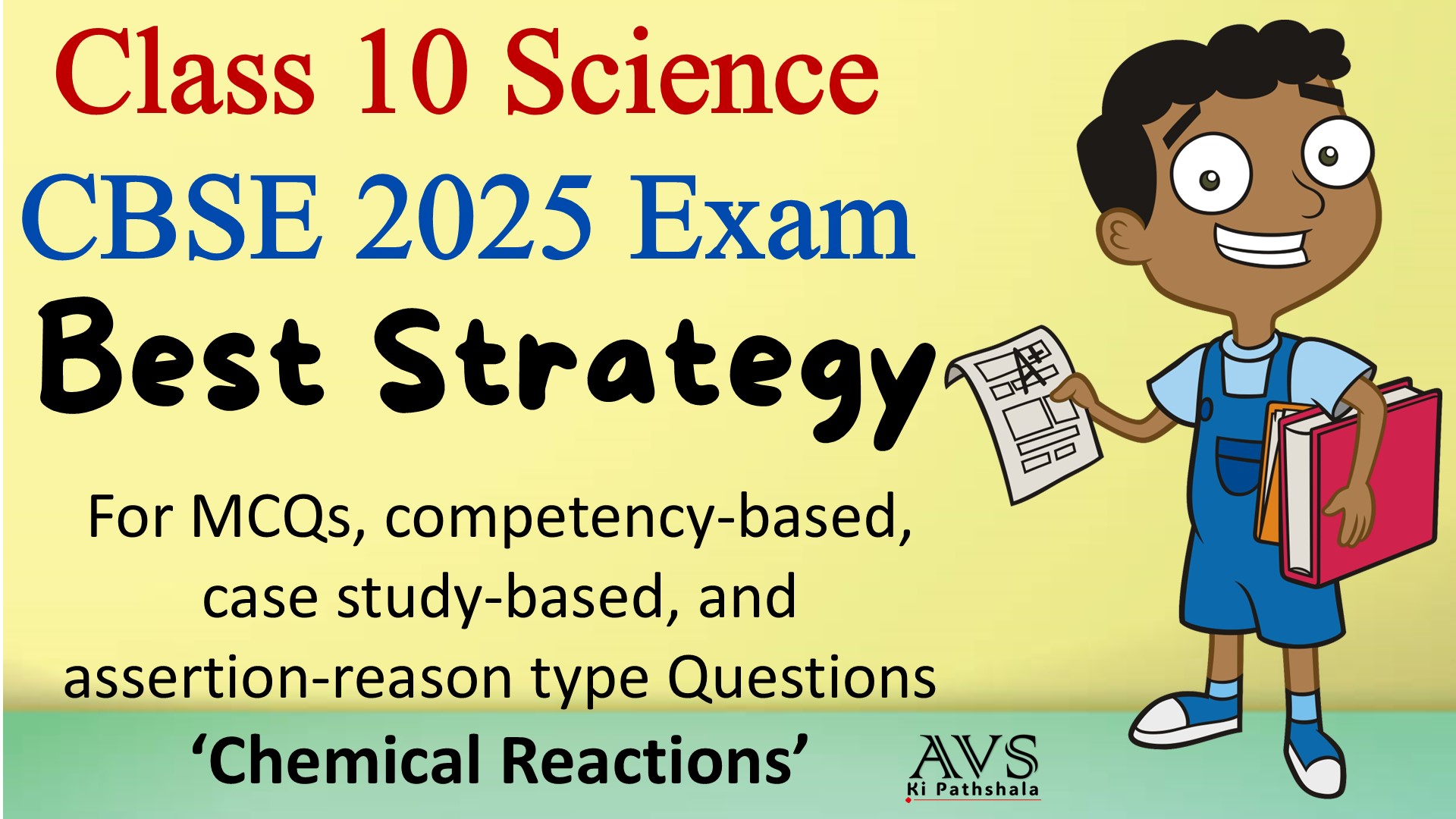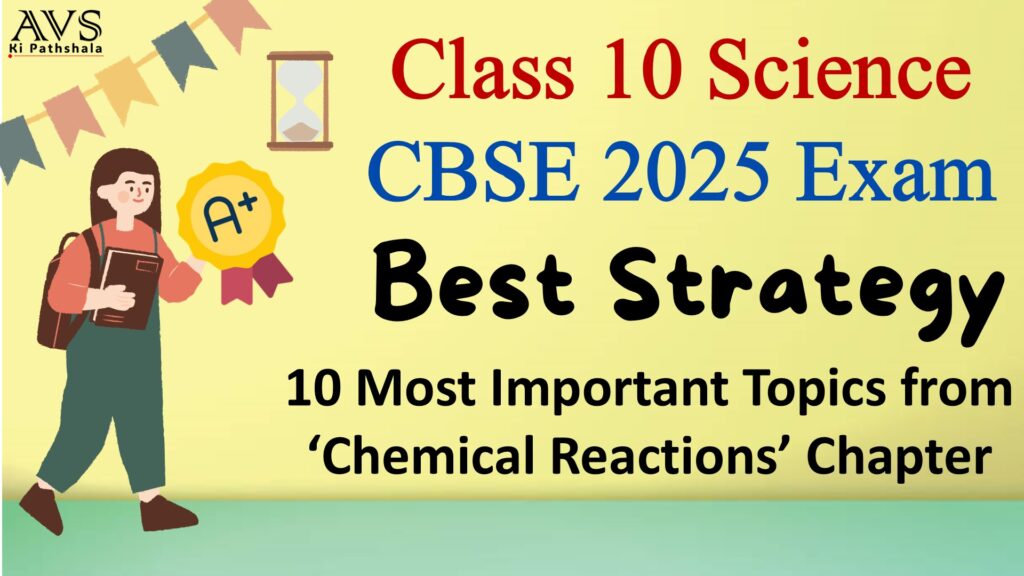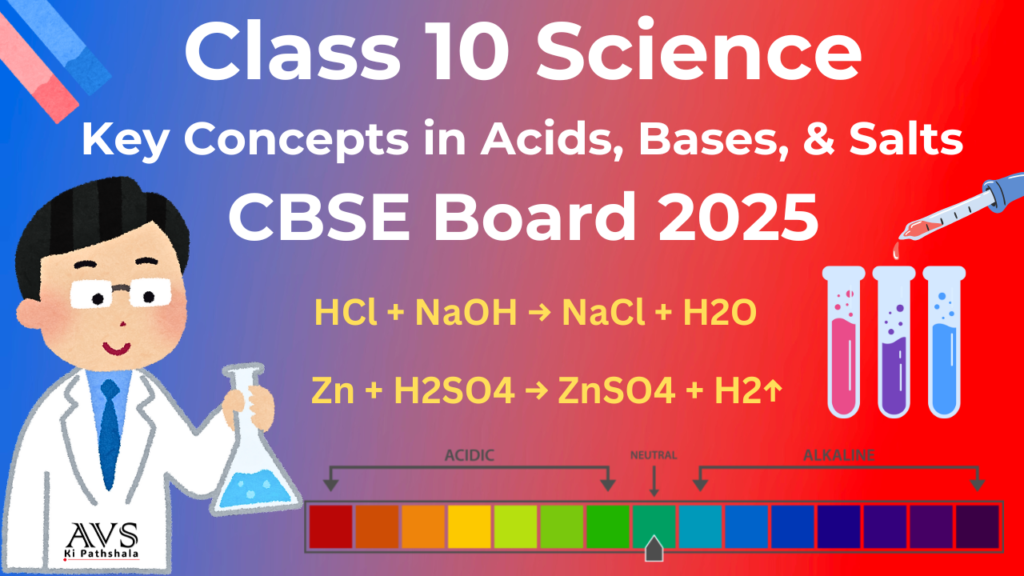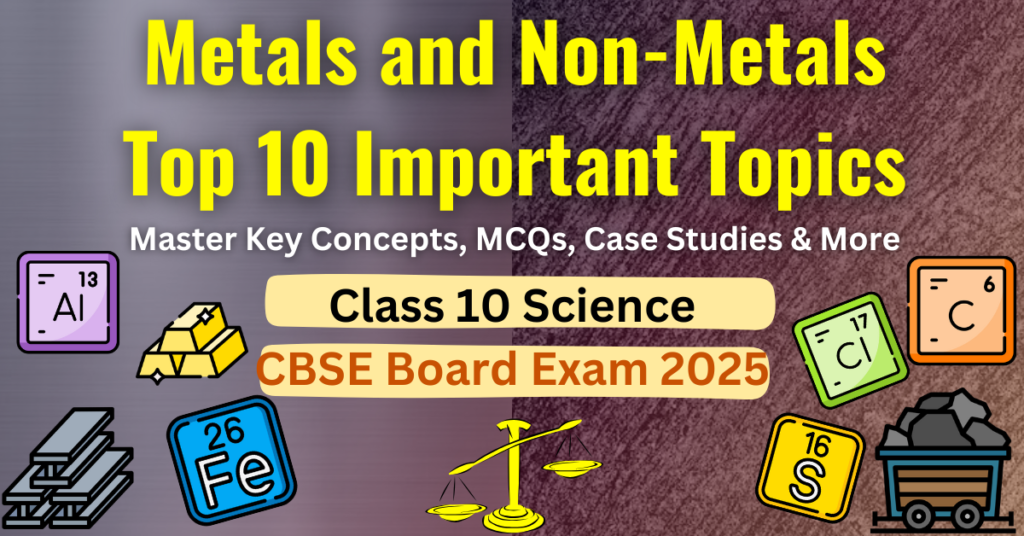Class 10 Science CBSE Board Exam 2025
To tackle the Class 10 Science CBSE Board Exam 2025 effectively, it’s important to understand the types of questions that may appear, such as MCQs, competency-based, case study-based, and assertion-reason types. Based on the analysis of past years’ questions, here’s how the topics from the “Chemical Reactions and Equations” chapter can be aligned with these question types.
Important Topics for Different Question Types:
1. Important Topics for MCQs (Multiple Choice Questions)
MCQs are generally focused on basic facts, definitions, and straightforward chemical concepts.
- Balancing Chemical Equations
Likely Question Type:- Identify the correct balanced equation from given options.
- Types of Chemical Reactions
Likely Question Type:- Recognize the type of reaction (combination, decomposition, etc.) from given examples.
- Endothermic and Exothermic Reactions
Likely Question Type:- Determine if a reaction is endothermic or exothermic based on a description.
- Oxidation and Reduction
Likely Question Type:- Identify oxidation and reduction agents in a given reaction.
- Reactivity Series of Metals
Likely Question Type:- Predict whether a displacement reaction will occur based on the metal reactivity series.
2. Important Topics for Competency-Based Questions
Competency-based questions test a student’s ability to apply concepts in real-world or experimental scenarios.
- Law of Conservation of Mass
Likely Question Type:- Apply the Law of Conservation of Mass in an experimental context. For example, students may be asked to explain why mass is conserved in a specific chemical reaction.
- Effects of Oxidation in Everyday Life
Likely Question Type:- Application-based scenarios such as explaining how food spoilage (rancidity) happens or how to prevent corrosion in metals.
- Precipitation Reactions
Likely Question Type:- Use an example where two solutions mix and form a precipitate. Competency-based questions could focus on understanding the conditions under which precipitation occurs.
- Corrosion and Rancidity
Likely Question Type:- Case studies on preventing corrosion of bridges or preventing food spoilage in everyday life can be typical examples.
3. Important Topics for Case Study-Based Questions
Case study-based questions are designed to assess a student’s ability to analyze and interpret data or situations based on real-life scenarios.
- Oxidation and Reduction (Redox Reactions)
Likely Question Type:- Given a real-life scenario like rusting of iron or tarnishing of silver, explain how oxidation and reduction are taking place.
- Reactivity of Acids and Bases with Metals
Likely Question Type:- A scenario such as using an acid to clean a metal object could be used, and students may be asked to explain the chemical reaction involved.
- Corrosion and its Prevention
Likely Question Type:- A case study about a bridge or a metal statue rusting, where students need to propose ways to prevent corrosion.
- Precipitation Reactions
Likely Question Type:- Case study involving water treatment using precipitation reactions, where students analyze how precipitates are used to clean water.
4. Important Topics for Assertion-Reason Questions
Assertion-reason questions check for deep understanding, requiring students to justify why a particular concept or reaction occurs.
- Types of Chemical Reactions
Likely Question Type:- Assertion: “In a combination reaction, two substances combine to form a single product.”
Reason: “Combination reactions release energy in the form of heat.”
(Students are asked to determine whether both statements are correct and if the reason explains the assertion.)
- Assertion: “In a combination reaction, two substances combine to form a single product.”
- Endothermic and Exothermic Reactions
Likely Question Type:- Assertion: “Combustion is an exothermic reaction.”
Reason: “Exothermic reactions release heat into the surroundings.”
(Students must determine the validity of both statements.)
- Assertion: “Combustion is an exothermic reaction.”
- Oxidation and Reduction
Likely Question Type:- Assertion: “In a redox reaction, one substance is oxidized while another is reduced.”
Reason: “Oxidation and reduction always occur together.”
(Students analyze the accuracy and connection between the two statements.)
- Assertion: “In a redox reaction, one substance is oxidized while another is reduced.”
- Corrosion
Likely Question Type:- Assertion: “Rusting of iron is a redox reaction.”
Reason: “Oxidation involves the gain of oxygen by a substance.”
(Students must evaluate if both statements are correct and how they relate.)
- Assertion: “Rusting of iron is a redox reaction.”
Conclusion:
Each of the question types in the CBSE exam tests different levels of understanding. While MCQs are more fact-based, competency-based and case study-based questions focus on the application of concepts in real-world situations. Assertion-reason questions test a deeper conceptual understanding. Mastering these topics and practicing varied question types is key to excelling in the CBSE 2025 Board Exam.
Important Points to Remember:
- MCQs test basic definitions, identification of reactions, and balancing equations.
- Competency-based questions often deal with real-life applications like corrosion, oxidation, and the law of mass conservation.
- Case study-based questions are usually built around practical examples involving oxidation, precipitation, and acids-bases reactions.
- Assertion-reason questions require a deeper understanding of concepts like redox reactions, exothermic/endothermic reactions, and types of chemical reactions.
Focus on practicing these question types for each topic, as they reflect the patterns observed in recent CBSE exams and will likely continue to be prominent in 2025.
To enhance your preparation even further for CBSE 2025 Exam, you can also connect with us on YouTube, where we will guide you through all these topics in a comprehensive manner. To join us on YouTube, simply click the link below, and you’ve already taken your first step towards scoring better marks.
In the next post, we will discuss the key topics of the chapter ‘Acids, Bases & Salts.’
Note: All the topics covered in this article are based on the “Chemical Reactions and Equations” chapter of Class 10 Science CBSE Board and have been curated after analyzing previous years question papers. This article can be helpful for students aiming for success in exams, but it’s also important to thoroughly understand the entire syllabus and practice regularly.
Best wishes to all students!
Thank you!





